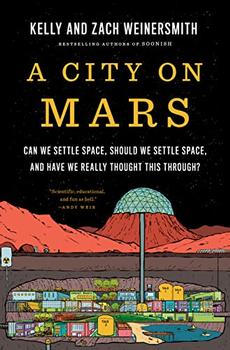Summary | Excerpt | Reading Guide | Discuss | Reviews | Beyond the book | Read-Alikes | Genres & Themes | Author Bio

Six days ago, astronaut Mark Watney became one of the first people to walk on Mars. Now, he's sure he'll be the first person to die there.
Six days ago, astronaut Mark Watney became one of the first people to walk on Mars.
Now, he's sure he'll be the first person to die there.
After a dust storm nearly kills him and forces his crew to evacuate while thinking him dead, Mark finds himself stranded and completely alone with no way to even signal Earth that he's alive - and even if he could get word out, his supplies would be gone long before a rescue could arrive.
Chances are, though, he won't have time to starve to death. The damaged machinery, unforgiving environment, or plain-old "human error" are much more likely to kill him first.
But Mark isn't ready to give up yet. Drawing on his ingenuity, his engineering skills - and a relentless, dogged refusal to quit - he steadfastly confronts one seemingly insurmountable obstacle after the next. Will his resourcefulness be enough to overcome the impossible odds against him?
The Martian really is a great deal of fun. I personally thought it was such a hoot that I ended up buying three copies to give to friends – something I seldom do. Readers looking for a fast, entertaining novel that will nourish their inner space geek will definitely want to pick up a copy...continued
Full Review
 (702 words)
(702 words)
(Reviewed by Kim Kovacs).
 Andy Weir's The Martian is set on the red planet, the fourth from the sun, which has been part of human consciousness since people first started observing the night sky. Its distinctive red color sets it apart from the other celestial objects. The oldest known star map, found in the tomb of 18th dynasty Egyptian architect Senenmut (who lived around 1400 BC), includes a depiction of Mars. It's mentioned in Egyptian writing even earlier. Chinese astronomers documented its position and orbit before the founding of the Zhou Dynasty in 1045 BCE. Galileo was the first person to observe the planet through a telescope – doing so in the early 17th century.
Andy Weir's The Martian is set on the red planet, the fourth from the sun, which has been part of human consciousness since people first started observing the night sky. Its distinctive red color sets it apart from the other celestial objects. The oldest known star map, found in the tomb of 18th dynasty Egyptian architect Senenmut (who lived around 1400 BC), includes a depiction of Mars. It's mentioned in Egyptian writing even earlier. Chinese astronomers documented its position and orbit before the founding of the Zhou Dynasty in 1045 BCE. Galileo was the first person to observe the planet through a telescope – doing so in the early 17th century.
The planet we now call Mars has had many names over the centuries. The Egyptians ...

If you liked The Martian, try these:

by Kelly Weinersmith, Zach Weinersmith
Published 2023
From the bestselling authors of Soonish, a brilliant and hilarious off-world investigation into space settlement

by Andy Weir
Published 2022
A lone astronaut must save the earth from disaster in this incredible new science-based thriller from the #1 New York Times bestselling author of The Martian.
These are not books, lumps of lifeless paper, but minds alive on the shelves
Click Here to find out who said this, as well as discovering other famous literary quotes!